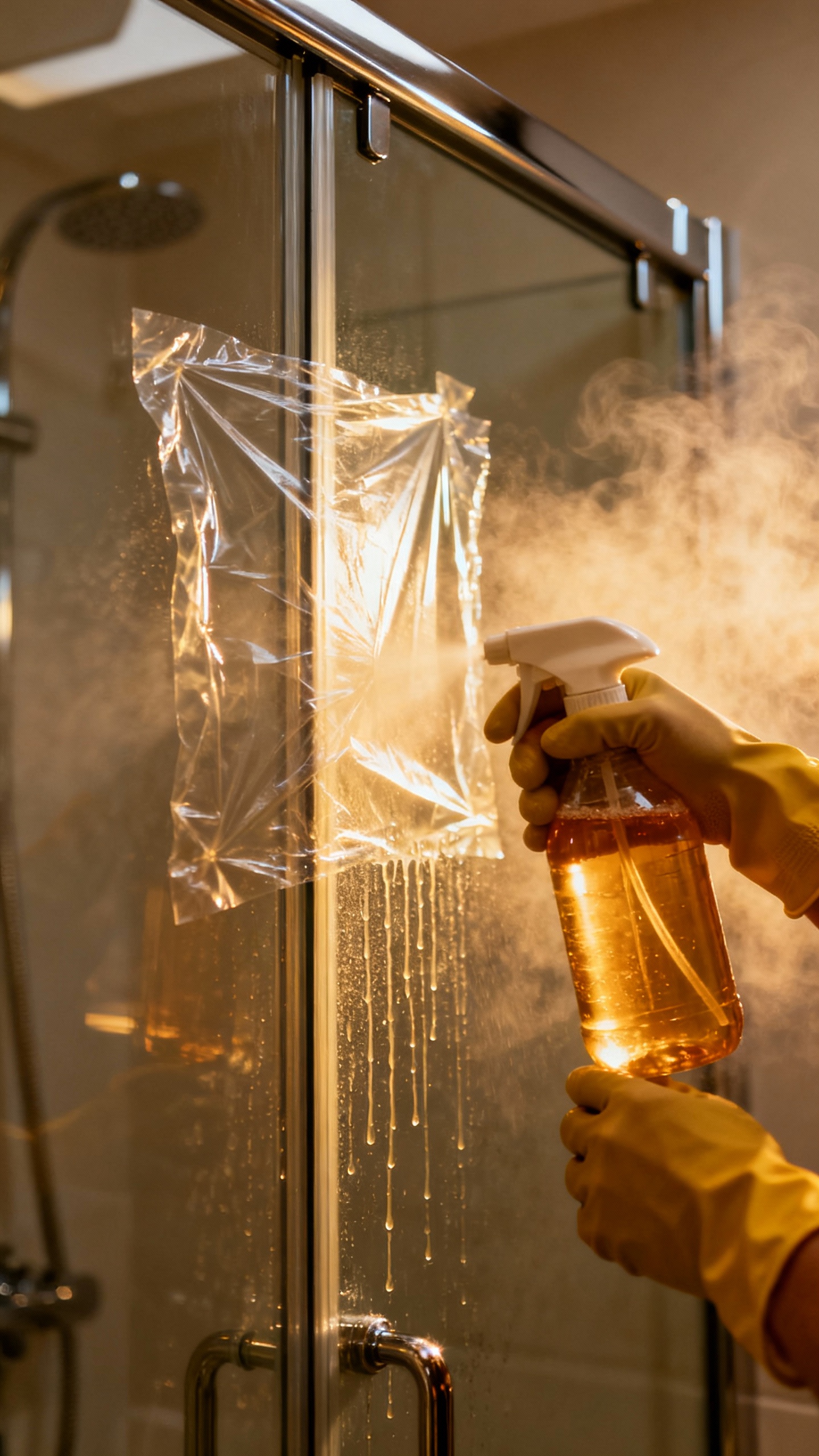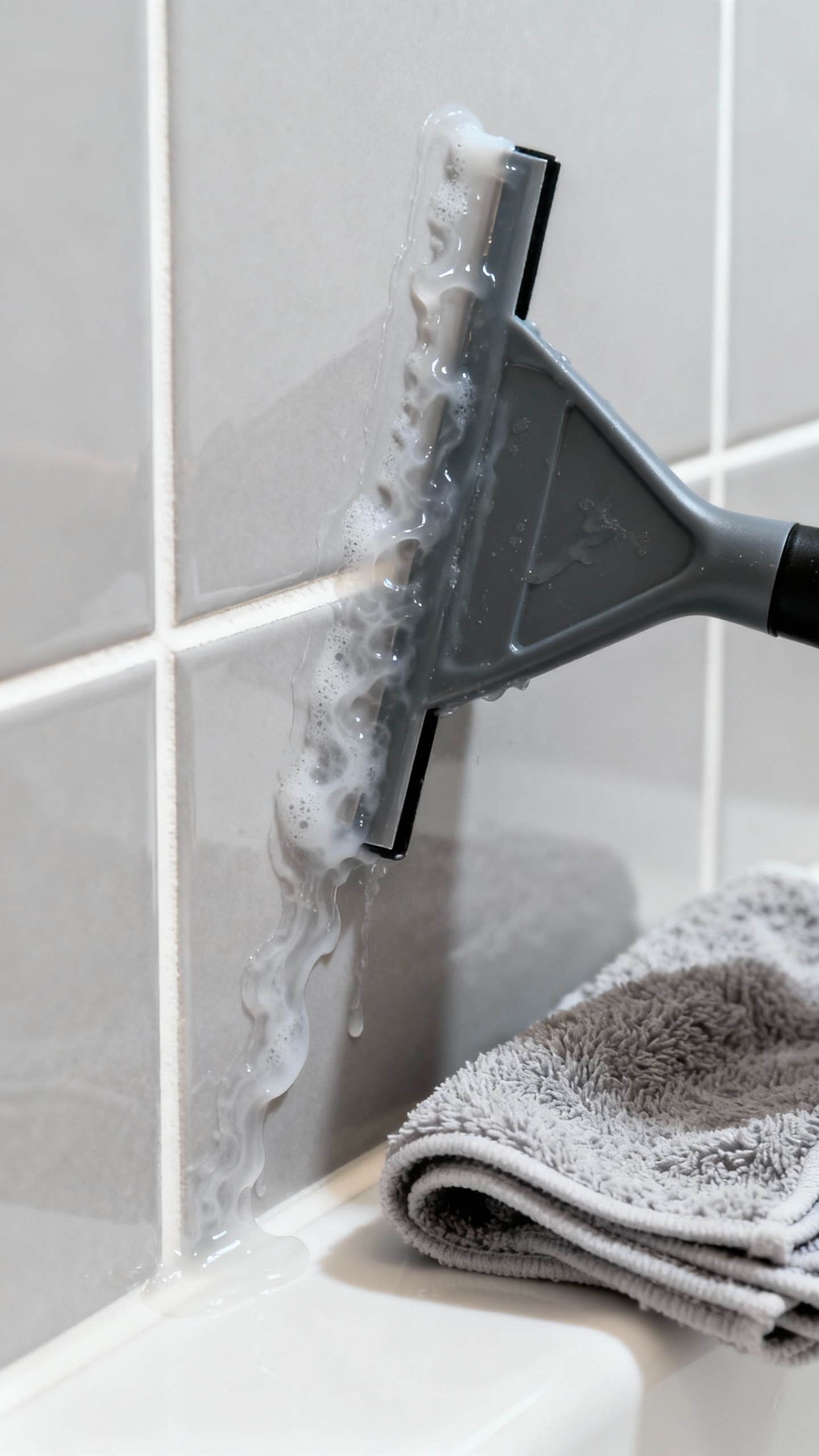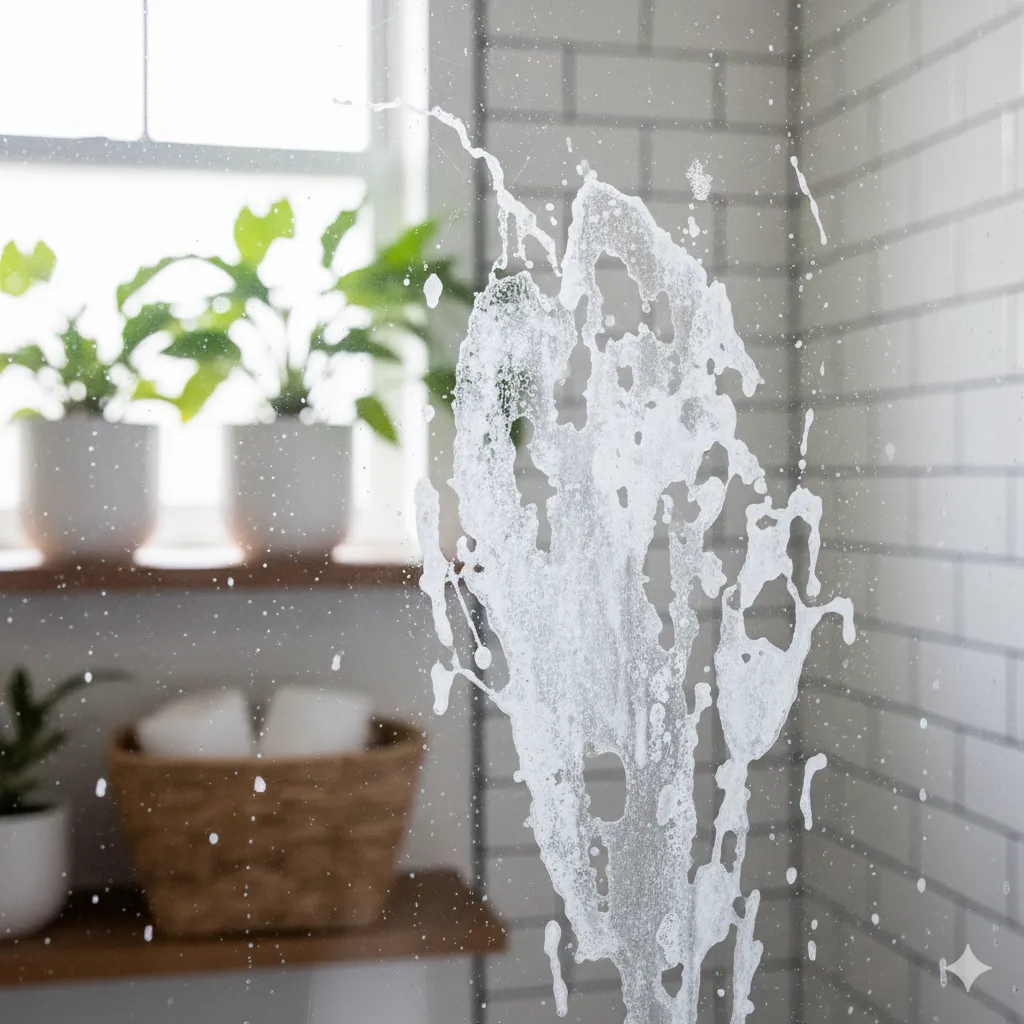Soap scum laughs at your sponge, mocks your elbow grease, and somehow multiplies overnight. You scrub, it shrugs. The good news?
You can melt it off without scrubbing like a medieval peasant. Let’s nuke the gunk the smart way and get your shower shining fast.
Why Soap Scum Sticks Like Superglue

Soap scum is a clingy combo of soap fats, hard water minerals, and body oils. It bonds with glass, tile, and metal like it pays rent.
Regular soap reacts with calcium and magnesium in your water and creates a filmy residue that loves texture. So if you scrub and it reappears, you didn’t mess up. The chemistry just favors the scum.
We’ll use different chemistry that favors you.
The Fastest No-Scrub Method (Spoiler: It’s Acid + Time)
You don’t need a gym membership for this. You need the right solution and a little patience. The secret: dissolve the minerals so the gunk slides off on its own. What you need:
- White distilled vinegar (warm it for extra power)
- Dish soap (a few drops of a grease-cutting kind)
- Spray bottle
- Microfiber cloth or squeegee
- Optional: Citric acid powder (for heavy buildup)
- Optional: Plastic wrap (to hold the solution in place)
- Gloves and good ventilation (FYI, vinegar smells like a salad)
How to do it (no scrubbing required):
- Warm 1 cup of vinegar until hot but not boiling.
Pour into a spray bottle and add 1 teaspoon dish soap. Swirl gently.
- Spray every scummy surface until it looks drenched. For vertical spots, press plastic wrap over the area so it stays wet.
- Let it sit 15–30 minutes.
For stubborn buildup, wait up to 60 minutes. The acid dissolves the minerals; the soap lifts oils.
- Rinse thoroughly with hot water. Wipe with a microfiber cloth or squeegee to remove loosened residue.
- Repeat once if you see cloudy patches.
Each round takes less time.
Heavy-duty option: Mix 1 tablespoon citric acid powder into 1 cup hot water, add a few drops of dish soap, and repeat the same steps. Citric acid hits hard water scum like a champ, IMO.
What if it’s really, really bad?
If your glass looks frosted, spray the solution, cover with plastic wrap, and leave it for 60–90 minutes. Then rinse and wipe.
Still cloudy? One more round usually does it.

Why This Works (Without Getting Nerdy About It)
Soap scum contains minerals, and minerals dissolve in acids. Vinegar and citric acid break the bond so the gunk lets go.
Dish soap lifts the greasy part so it can’t cling. No scrubbing needed because you’re undoing the chemistry that made the mess.
Skip These Common Mistakes
- Don’t mix vinegar with bleach or ammonia. Toxic fumes. Hard no.
- Don’t use acid on natural stone. Marble, travertine, limestone, and some terrazzo can etch.
Use a stone-safe cleaner instead.
- Don’t rinse too fast. Contact time matters. Give it the full 15–30 minutes.
Got Stone? Use This Stone-Safe Plan
Acids and stone hate each other.
If your shower has marble or limestone, do this instead. Stone-safe method:
- Spray a pH-neutral stone cleaner or a solution of warm water + a few drops of stone-safe dish soap.
- Let it sit 10–15 minutes to soften residue.
- Use a soft microfiber cloth to wipe—no abrasives, no scrubbing pads.
- Rinse well and dry immediately.
For heavy buildup on stone: Use a product labeled “soap scum remover – safe for natural stone.” Read labels. Your countertop doesn’t need a chemical peel.
Tools That Make It Even Easier
You said “no scrubbing,” and we’re sticking to it. But a few helpers speed things up.
- Spray-and-stick trick: Plastic wrap keeps the solution from dripping, which boosts dissolving power.
- Magic eraser (light pressure): After soaking, a quick wipe helps lift residue.
Gentle, not aggressive.
- Squeegee: Clears loosened film and speeds drying.
- Microfiber cloth: Leaves glass streak-free without buffing forever.
What About Commercial Cleaners?
Plenty work great. Look for “soap scum remover” with acids like lactic, citric, or sulfamic acid. Avoid ones heavy on fragrance and light on actual ingredients.
Always test in a corner first.
Prevent Soap Scum So You Don’t Have To Do This Again
Easy wins so you don’t repeat this saga next weekend:
- Switch to liquid body wash. Bar soap often contains tallowate or stearate that loves to form scum.
- Keep it dry. Squeegee glass and tile after showers. Takes 30 seconds. Saves your future self.
- Quick daily spray: Mix 1 cup water + 1 cup vinegar + a few drops dish soap.
Mist after each shower (not on stone). No rinse needed.
- Soften your water. A water softener or inline shower filter reduces minerals. Less minerals = less scum.
FYI, this is the long-term flex.
- Ventilate. Run the fan or crack the door. Dry surfaces repel buildup.
Weekly 5-Minute Routine (For Real)
- Saturday: Spray vinegar mix, wait 10 minutes while you sip coffee, rinse, squeegee.
- Midweek: Quick mist and squeegee. Done.
Troubleshooting: If It’s Not Coming Off
If the scum still clings like your cat at the vet, try this:
- Increase contact time. Double the wait, keep it wet with plastic wrap.
- Warm the solution. Heat boosts effectiveness.
Just don’t melt your bottle.
- Move to citric acid. Stronger than vinegar, still gentle compared to harsh chemicals.
- Check your surface. If it’s etched glass or damaged coating, you’re seeing permanent marks, not scum.
- Try a dedicated product. Look for lactic/citric/sulfamic acid on the label.
Hard Water Pros and Cons (Mostly Cons)
Hard water brings more calcium and magnesium, which means more scum. A shower filter won’t fully soften water, but it can reduce minerals and sediment. If your doors cloud up days after cleaning, consider a whole-home softener.
Not cheap, but IMO it pays for itself in saved time and less product.
FAQs
Can I use vinegar on every surface?
Nope. Skip vinegar on natural stone like marble, limestone, and travertine. It can etch and dull the finish.
Use stone-safe cleaners there. For glass, ceramic tile, chrome, and fiberglass, vinegar works great.
How long should I let the solution sit?
Give it 15–30 minutes for most buildup. Go up to 60–90 minutes for heavy scum, and keep it wet with plastic wrap if it starts to dry.
The longer contact time lets the acid dissolve more mineral residue, which means less effort for you.
Is dish soap really necessary?
Yes. It tackles the oily part of the grime so the whole mess releases easier. Without it, you might dissolve minerals but leave a slick behind.
A few drops do the trick—don’t overdo it or you’ll chase suds for days.
What’s better: vinegar or citric acid?
Both work. Vinegar is cheap, easy, and effective for moderate scum. Citric acid is stronger per ounce, smells better, and stores easily as a powder.
If you battle chronic hard water, citric acid usually wins.
Will this method damage my shower sealant or grout?
Used properly, no. Keep acids off unsealed cement grout for long soaks, and rinse well. For sealed grout, you’re fine.
If you worry about sealant, test a small hidden area first and avoid letting solution pool on caulk lines for hours.
Do I need to scrub at all?
Not if you allow enough contact time. The solution dissolves the scum so a rinse and wipe clears it. If the buildup is ancient, light wiping with a microfiber cloth after soaking may help—but think “glide,” not “scrub.”
Wrap-Up: Melt the Scum, Save Your Saturday
You don’t need biceps or steel wool.
You need a warm vinegar or citric acid mix, a little dish soap, and 30 minutes of let-it-sit time. Rinse, wipe, done. Keep it from coming back with a quick daily spritz and a squeegee.
Your shower gets shiny, your weekend stays free, and you retire the scrub brush—IMO, that’s a win.


